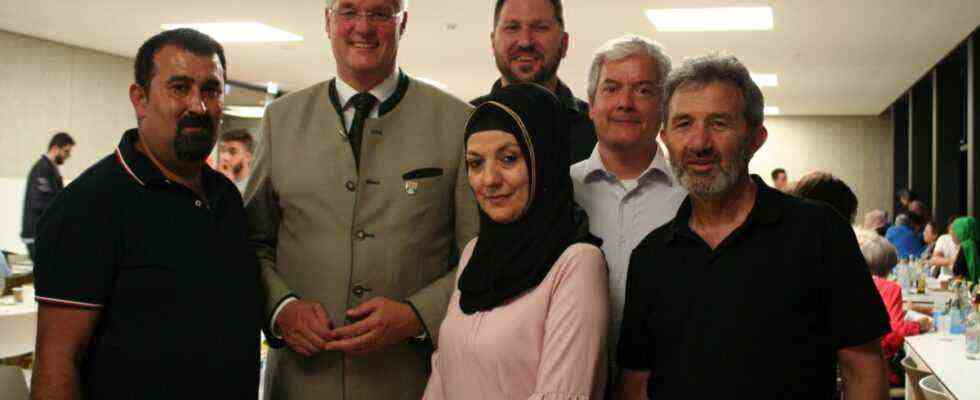The dialogue between cultures has occupied Claudio Cumani for decades. The native Italian has lived and worked in Garching for almost 30 years, where the astrophysicist works as a software engineer at the European Southern Observatory ESO. Since 2016 he has also chaired the Garching Integration Advisory Board. In the committee, established in 2005, citizens with a migration background are committed to successful coexistence in urban society. The advisory board will be re-elected this spring.
SZ: Mr. Cumani, you have been a member of the Garching Integration Advisory Board since 2009, and you have been its chairman since 2016. What motivated you to get involved there?
Claudio Cumani: I was involved in integration policy before, including as chairman of the Italian Committee in Bavaria. In 2009 I thought, maybe I can use my network and my experiences to do something for the city in which I live. For me, living together means looking for an exchange with others and being curious. Garching is a very international municipality – people from more than 120 nations live here. It’s not always easy, but I also see it as an opportunity to live with so many people from other cultures.
Is everyone aware of this diversity?
It is still very important to make it known that people from many cultures live together here, that good coexistence and fear-free coexistence is possible when we approach one another. You often live together, but not necessarily with each other. For everyone who arrives here, it is first of all a challenge to find their way into the structures of urban society that have grown over the years and to find their place. For example, when it comes to communication: Is it customary to approach a member of the city council directly with a concern, or do you first establish a personal relationship before making a request? Cultural differences can make it difficult to find their way into the structures, but in principle you can also see this with new citizens, for example from northern Germany.
“There have been injuries on both sides.”
What are you doing as an integration advisory council to make coexistence a success?
We are a group that speaks many languages, from Portuguese to Farsi, Turkish, Italian, English to Chinese. The city council often contacts us when newcomers arrive in the city. We are also very well connected. And we have now built up a great deal of knowledge about cultural characteristics and intercultural communication. Misunderstandings often arise from cultural differences that we are not even aware of. In Italy, for example, it is customary to interrupt someone’s flow of speech if you agree. Something very positive – in Germany, on the other hand, that’s a great impoliteness. I had to learn that first. As integration councils, we try to mediate in conflicts with such a cultural background or to prevent them from arising in the first place, to be bridges between cultures. We organize events with other Garching groups, such as breaking the fast between Muslims and Christians or excursions. It’s also enriching for me personally, I learn a lot from others. Human encounters are the best prevention against prejudice.
Last has a Conflict between the two Garching football clubs, Türk Sport and VfR the mood in the city strained. It was about racism allegations at a regional class game between the two teams.
This is a very sensitive subject, so I don’t want to say too much about it. As the integration advisory board, we were called in from the start and talked to all sides. There have been injuries on both sides. We hope that we can make progress soon and find a solution together, also together with the Bavarian Football Association (BFV). We have been working trustfully with the BFV with its conflict manager and mediator program for more than two years; at that time we could fight over the military salute (which some Turkish-born players had shown on the soccer field, editor’s note) find a good solution.
Claudio Cumani comes from Italy and has lived and worked in Garching for almost 30 years.
(Photo: Robert Haas)
Where do you see the most important tasks of the Integration Advisory Board in the coming term of office?
We want to make it clear that integration is a matter for society as a whole and for politics at all levels. The city of Garching still lacks a little awareness that we are an international city – for example, the homepage of a university city should also be available in other languages, at least in English. In order to raise this awareness, we want to be even more present and also raise our voice in urban politics. I hope that we will bundle the many good examples that already exist in Garching and finally develop an integration concept. That we should ask ourselves the question: How can all Garchingers, no matter where they come from, live well together in 2030? We also want to further strengthen the exchange with integration advisory boards in other municipalities, including through the Bavarian umbrella organization Agaby, through which we have recently made many valuable contacts.
What should the new integration advisory board look like?
We try to win new members for our committee in order to broaden our horizons even more. I hope that we can also encourage representatives of the refugees who have come to us in recent years to get involved.
Interested citizens of Garching can apply as candidates for the integration advisory board until January 28th. More information and the application form are available from Christopher Redl, head of the city’s education and social affairs department, on 089/320 89 154 or by email [email protected].

